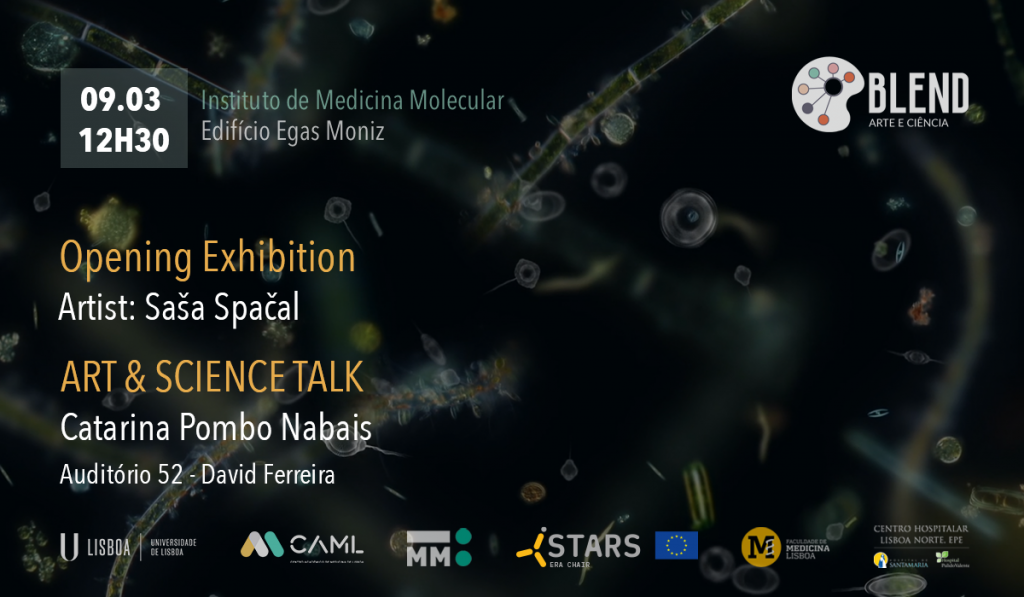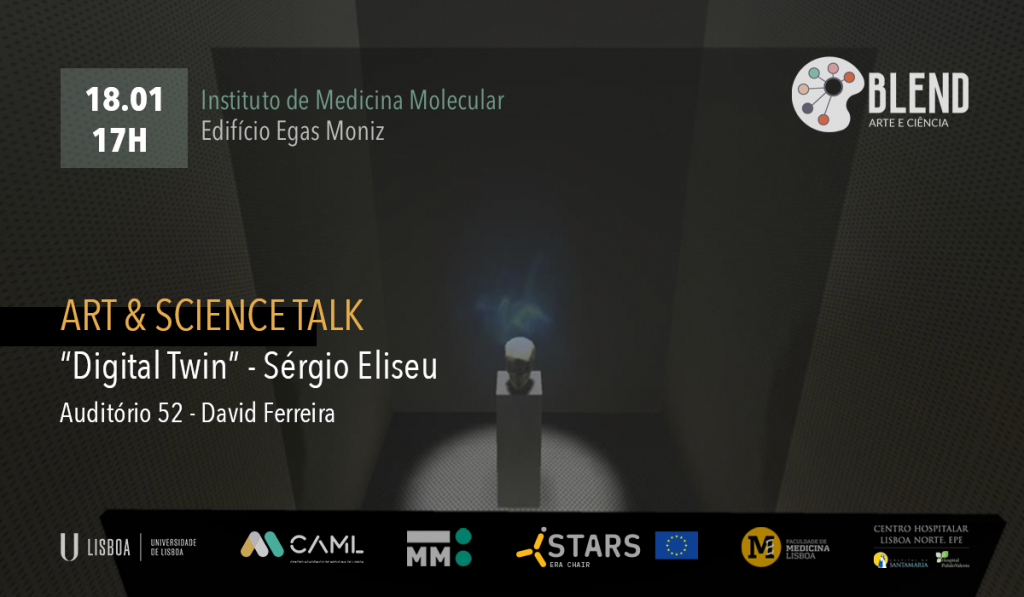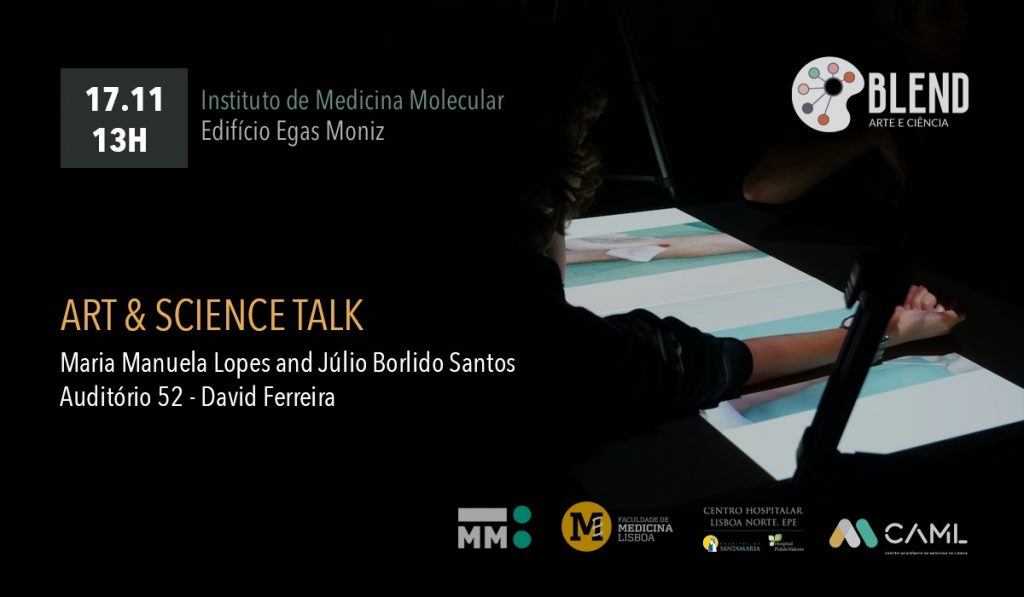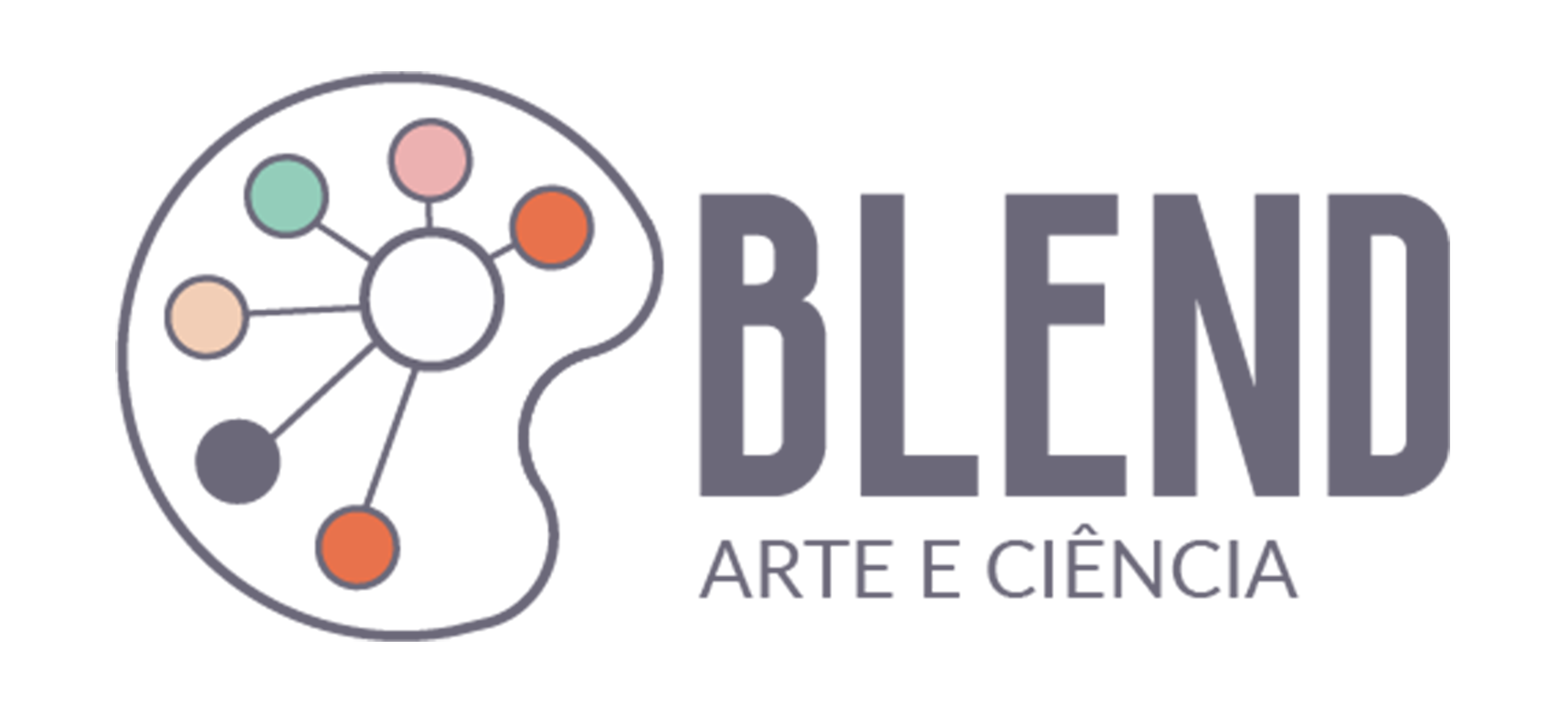Art & Science talks
09/03/2023
Catarina Pombo Nabais
Title: The Practice of Tattoing and the Paradigmatic Place of Medicine in Science & Art Studies

ABOUT
PT//
A minha palestra questionará a relação entre tatuagens e medicina, tanto no passado como no presente. De uma perspectiva histórica, pretendo mostrar como a forma médica de observar, catalogar, arquivar e compreender a tatuagem nas últimas décadas do século XIX e início do século XX na Europa, foi alinhada com uma cultura conservadora e repressiva. Isto contribuiu para a marginalização dos indivíduos tatuados. Mas, mais importante ainda, isto levou à profunda ligação da medicina com a disciplina emergente da Criminologia. Agora, da perspectiva atual e mesmo futurista, meu objetivo é compreender como a invenção das tatuagens biotecnológicas, mesmo que possa manter a sua dimensão de vigilância, ainda reverteu a relação da medicina com as tatuagens, uma vez que as tatuagens tecnológicas podem constituir um passo muito importante para a medicina personalizada. Além disso, salientarei como, ao longo de toda esta história da medicina, a arte tem sido aliada a medicina, tanto na fundamentação das coleções médicas dos catálogos de tatuagens como na exploração das possibilidades artísticas da biotecnologia na concepção do corpo.
Assim, a minha hipótese de trabalho é que a tatuagem (seja ela clássica, seja ela tecnológica) pode ser tomada como um estudo de caso pertinente para a compreensão da medicina de uma forma filosófica, epistemológica, histórica, sociológica, cultural, tanto no passado, como no presente e, talvez, no futuro.
EN//
My talk will question the relation between tattoos and medicine both in the past and in the present times. From a historical perspective, I aim to show how the medical way of observing, cataloging, archiving, and understanding tattooing in the last decades of the XIX and the beginning of the XX century in Europe, was aligned with a conservative, repressive culture. This contributed to the marginalization of tattooed individuals. But, most importantly, this led to the deep connection of medicine with the emerging discipline of Criminology. Now, from the present and even futuristic perspective, my aim is to understand how the invention of biotechnological tattoos, even if it may keep its surveillance dimension, has yet reversed the relation of medicine with tattoos, as tech-tattoos may constitute a very important step towards personalized medicine. Further, I will stress how, all along this history of medicine, art has been an allied of medicine both in the substantiation of the medical collections of tattoo’s catalogs and in the exploration of the artistic possibilities of biotechnology in the design of the body.
Thus, my working hypothesis is that the tattoo (be it classical, be it technological) may be taken as a pertinent case study for the understanding of medicine in a philosophical, epistemological, historical, sociological, cultural way, either in the past, as in the present and, maybe, in the future.
BIO
PT//
Catarina Pombo Nabais é Licenciada em Filosofia – Variante em Filosofia da Ciência – pela Faculdade de Letras da Universidade de Lisboa (1998), obteve o seu Diplôme d’Études Approfondies em Filosofia na Universidade de Amiens, França, (1999) e concluiu o seu doutoramento em Filosofia pela Universidade de Paris VIII, sob a supervisão do filósofo Jacques Rancière (2007) com a mais alta distinção para uma dissertação de doutoramento em França. Em 2013, publicou o seu primeiro livro intitulado Gilles Deleuze: Philosophie et Littérature, do editor francês L’Harmattan, Paris, com um Prefácio de Jacques Rancière. Ronald Bogue, uma figura importante dos estudos deleuzianos nos EUA, decidiu traduzir e prefaciar o livro para inglês e o seu livro foi publicado nos EUA pela editora Roman & Littlefield (2020). Mais recentemente, publicou um livro em conjunto com o filósofo e crítico de arte Boris Groys Towards Self-Design. Conversas Filosóficas (Coimbra: Imprensa da Universidade de Coimbra, 2022) e editou o livro Processos Criativos na Ciência e nas Artes. A questão da participação do público (Lisboa: Afrontamento, 2019).
Desde 2019, é Investigadora Científica no Departamento de História e Filosofia das Ciências da Universidade de Lisboa. De 2007-2019, foi Bolseira de Pós-Doutoramento com uma bolsa atribuída pela Fundação Portuguesa para a Ciência e Tecnologia (FCT) no Centro de Filosofia da Ciência da Universidade de Lisboa (CFCUL), do qual é membro integrado desde 2006. Na CFCUL, de 2007 a 2014 foi a chefe do grupo de investigação Ciência e Arte. Em 2014, criou a linha temática Science-Art-Philosophy Laboratory (SAP Lab), que dirige (Head) desde então. Atualmente, é também Vice-Diretora do grupo de investigação Filosofia da Tecnologia, Ciências Humanas, Arte e Sociedade. Catarina Pombo Nabais pertence ao corpo docente do Programa Internacional de Doutoramento “Filosofia da Ciência, Tecnologia, Arte e Sociedade”, principalmente no que diz respeito à área da “Ciência e Arte”. Ela supervisiona várias teses de doutoramento, tem publicado muitos textos no estrangeiro e é frequentemente convidada a dar palestras em universidades de todo o mundo.
Como curadora de Arte, organizou, entre outros, a exposição “O mais profundo é a pele”. Coleção de tatuagens IML de 1910-1940″, no MUDE – Museu de Moda e Design, Lisboa, em 2017, que foi considerada pelo “Timeout” como uma das melhores do ano 2017. Catarina Pombo Nabais é curadora convidada para a área de “Ciência, Arte e Filosofia” do Festival Internacional de Ciência “FIC.A”, organizado pela Câmara Municipal de Oeiras. É também fundadora e curadora da Galeria de Arte “Oficina Impossível” em Lisboa e curadora convidada do “Coletivo à Linha”, um grupo de artistas de Cascais.
EN//
Catarina Pombo Nabais is Graduated in Philosophy – Variant in Philosophy of Science – by the Faculty of Letters of Lisbon University (1998), she obtained her Diplôme d’Études Approfondies in Philosophy at the University of Amiens, France, (1999) and concluded her PhD in Philosophy by the University of Paris VIII, under the supervision of the philosopher Jacques Rancière (2007) with the highest distinction for a PhD dissertation in France. In 2013, she published her first book titled Gilles Deleuze: Philosophie et Littérature, by the French editor L’Harmattan, Paris, with a Preface from Jacques Rancière. Ronald Bogue, a major figure in Deleuzian studies in the USA, decided to translate and to preface the book into English and her book was published in the USA by the publisher Roman & Littlefield (2020). More recently, she published a book together with the philosopher and art critic Boris Groys Towards Self-Design. Philosophical Conversations (Coimbra: Coimbra University Press, 2022) and edited the book Creative Processes in Science and Arts. The issue of public participation (Lisbon: Afrontamento, 2019).
Since 2019, she is Scientific Researcher at the Department of History and Philosophy of Sciences of the University of Lisbon. From 2007-2019, she was a Postdoctoral fellow with a grant awarded by the Portuguese Foundation for Science and Technology (FCT) at the Center for Philosophy of Science of the University of Lisbon (CFCUL) of which she has been an integrated member since 2006. At the CFCUL, from 2007 to 2014 she was the Head of the research group Science and Art. In 2014, she created the thematic line Science-Art-Philosophy Laboratory (SAP Lab) which he has been directing (Head) since then. Also, she is currently Vice-head of the research group Philosophy of Technology, Human Sciences, Art and Society. Catarina Pombo Nabais belongs to the faculty of the International Doctoral Program “Philosophy of Science, Technology, Art and Society”, mainly in what concerns the area of “Science and Art”. She supervises several doctoral theses, has published many texts abroad and is frequently invited to give lectures at universities around the world.
As Art Curator, she has organized, among others, the exhibition “The most profound is the skin. Collection of IML tattoos from 1910-1940”, at the MUDE – Museum of Fashion and Design, Lisbon, in 2017 which was considered by “Timeout” as one of the best of the year 2017. Catarina Pombo Nabais is Guest Curator for the area of “Science, Art and Philosophy” of the International Science Festival “FIC.A”, organized by the Municipality of Oeiras. She is also the founder and curator of the “Oficina Impossível” Art Gallery in Lisbon and guest curator of “Coletivo à Linha”, a group of artists from Cascais.
18/01/2023
Sérgio Eliseu e Brígida Riso

ABOUT
PT// Sobre projeto iSTARS
O projeto ERA Chair iSTARS é um projeto da Faculdade de Medicina da Universidade de Lisboa, com a duração de seis anos, financiado pela União Europeia (Projeto 952377), que tem como principal objetivo a promoção da ciência de dados como uma ferramenta de investigação em saúde e medicina, através da criação e consolidação de uma unidade de ciência dados de excelência reconhecida internacionalmente, liderada pelo/a investigador/a ERA Chair.
EN// About the iSTARS project
The ERA Chair iSTARS project is a six-year project of the Faculty of Medicine of the University of Lisbon, funded by the European Union (Project 952377), whose main goal is the promotion of data science as a research tool in health and medicine, through the creation and consolidation of an internationally recognized data science unit of excellence, led by the ERA Chair researcher.
ERA Chair iSTARS – Informatics and Statistical Tools for the Advancement of Research Success is a project of Lisbon School of Medicine (FMUL, Portugal) funded by the EU for a 6-year period. iSTARS will enact a true transformational change that will promote excellence in research and in acquisition of funding, by forming a new unit led by a researcher recruited for the ERA Chair position.
BIO
PT//
Sérgio combina seus projetos artísticos com atividades de ensino. Atualmente é Professor convidado do Departamento de Comunicação e Arte da Universidade de Aveiro e Professor Coordenador do ISCE DOURO – Instituto Superior de Ciências Educativas do Douro. Coordena o NIAM – Grupo de Investigação em Artes e Multimédia do ISCE DOURO. É membro do ID+, Instituto de Investigação em Meios de Design e Cultura. É também Designer Sénior (Design) na AbsoluteBPC (empresa de dispositivos médicos) desde 2017. Recentemente, o trabalho de Sérgio foi distinguido nos Prémios da Associação Portuguesa de Museologia (2021), na categoria multimédia.
O trabalho artístico de Sérgio tem estado presente em várias exposições de arte a partir de 1994. Os seus trabalhos mais recentes e relevantes foram:
- 2011- “(Un)seen Sculptures” Sydney / Melbourne / Cairns.
- 2012 – “ARnatomy” CAE – Centro de Artes e Espetáculos da Figueira da Foz – Portugal.
- 2015 – “Selfie Museum” – ARTECH 2015 – Museum Abílio de Mattos e Silva; Óbidos, Portugal.
- 2015 – “Imaginary Museum” – Museu de Aveiro. Portugal.
- 2017 – “Pequenas Histórias do ser” – in “Olhar e Experiência: Interferências no Arquivo” – Museu Penafiel. Portugal.
- 2017- “Homúnculo” EM MEIO9.0 do #16.ART. Museu da Escola de Belas-Artes do Porto Artes. Portugal.
- 2018- “INHUMATUS”. Porta 14 – Lisboa. Com Gilberto Reis e Moirika Reker, Portugal.
- 2018- “Space time” in “Matéria Pensamento Tempo Forma” – Museu Penafiel, Portugal.
- 2019 – “A terra é feita de céu”. VR project in “Ensaio” – Atelier Eliseu. Lousã. Portugal.
- 2019 – “INHUMATUS VR”. Escola Superior de Belas Artes de Lisboa (Universidade de Lisboa). Com Gilberto Reis e Moirika Reker. #18. Art, Lisboa, Portugal.
- 2021 – Uma Pedra no Estômago – Instalação/Performance. Conferência Internacional ARTECH2021 Aveiro. Com Gilberto Reis.
- 2021 – Two Polish Jews: Rich and Poor. Trabalho em vídeo sobre imagens de Mussorsky na exposição “Viver ao vivo com tempo no centro”. Celorico da Beira. Portugal.
EN//
Sérgio combines his artistic projects with teaching activities. Currently he is an invited Professor at the Department of Communication and Art at the University of Aveiro and Coordinator Professor at ISCE DOURO – Instituto Superior de Ciências Educativas do Douro (Institute of Educational Sciences of Douro). He coordinates NIAM – Research Group in Arts and Multimedia at ISCE Douro.. He is a member of ID+, Institute for Research in Design Media and Culture. Heis also Senior Designer (Design) at AbsoluteBPC (medical device company) since 2017. Recently, Sérgio’s work was distinguished at Awards of the Portuguese Museology Association (2021) in the multimedia category.
Sérgio’s artistic work has been present in several art exhibitions from 1994 onwards. His most relevant and recent works were:
- 2011- “(Un)seen Sculptures” Sydney / Melbourne / Cairns.
- 2012 – “ARnatomy” CAE – Centro de Artes e Espetáculos da Figueira da Foz –
- Portugal
- 2015 – “Selfie Museum” – ARTECH 2015 – Museum Abílio de Mattos e Silva; Óbidos.
- Portugal.
- 2015 – “Imaginary Museum” – Museum of Aveiro. Portugal
- 2017 – “Pequenas Histórias do ser” – in “Olhar e Experiência: Interferências no
- Arquivo” – Penafiel Museum. Portugal
- 2017- “Homúnculo” EM MEIO9.0 do #16.ART. Museum of the Oporto School of Fine
- Arts. Portugal
- 2018- “INHUMATUS”. Porta 14 – Lisboa. With Gilberto Reis and Moirika Reker.
- Portugal
- 2018- “Space time” in “Matéria Pensamento Tempo Forma” – Penafiel Museum.
- Portugal
- 2019 – “A terra é feita de céu”. VR project in “Ensaio” – Atelier Eliseu. Lousã. Portugal
- 2019 – “INHUMATUS VR”. Lisbon School of Fine Arts (University of Lisbon). With
- Gilberto Reis and Moirika Reker. #18. Art, Lisboa, Portugal.
- 2021 – Uma Pedra no Estômago – Installation/Performance. International
- Conference ARTECH2021 Aveiro. With Gilberto Reis.
- 2021 – Two Polish Jews: Rich and Poor. Video work on Mussorsky pictures at the
- exhibition “Viver ao vivo com tempo no centro”. Celorico da Beira. Portugal
17/11/2022
Maria Manuela Lopes e Júlio Borlido Santos

BIO
PT//
Maria Manuela Lopes é uma artista visual com uma prática transdisciplinar, é investigadora no i3S e co-responsável pela interface Cultural Outreach Art/Science da Instituição. Fez um mestrado no Goldsmiths College London. Tem um Doutoramento nas Belas Artes da Universidade de Brighton e da UCA-Farnham e um Projecto de Investigação Pós-Doutoral em Arte no ID+ e i3S. É reitora do Departamento de Artes e Multimédia do ISCE Douro e co-fundadora e Directora Adjunta dos programas de residência artística: Ectopia: Laboratório de Experimentação Artística e Cultivamos Cultura. Também é diretora de uma Academia Internacional de Música e Artes (A2DV).
Júlio Borlido Santos é um Biólogo que trabalhou no campo da Biologia Vegetal; Mestre em Biologia Molecular e Celular; e está atualmente a fazer um programa de doutoramento em Ciências da Comunicação. Trabalhou como investigador em Ciências da Vida, professor e demonstrador na Universidade do Porto. De 2003-2014 foi Chefe do IBMC.INEB Office for Science Communication (OSC), e em 2015 passou a fazer parte dos coordenadores da Unidade de Comunicação da i3S. Ambas as unidades funcionam como ponte entre os investigadores e a sociedade, promovendo o i3S em diferentes eventos/locais, a fim de atingir um vasto leque de públicos. Ensina e promove formação avançada para cientistas sobre “Ciência, Ética e Sociedade” e organiza várias actividades de formação contínua para professores do ensino secundário; é/foi membro de vários projectos nacionais e internacionais de ciência na sociedade, nomeadamente o “Evaluating the state of public knowledge on health and health information in Portugal” e de um projecto da Loja da Ciência Portuguesa “Engaging Society”: Ciências da Vida, Ciências Sociais e Público”, ambos financiados pela FCT.


EN//
Maria Manuela Lopes is a visual artist with a transdisciplinary practice, is a researcher at i3S as co-responsible for the Cultural Outreach Art/Science interface of the Institution. She did an MA at Goldsmiths College London. She has a Doctorate in Fine Arts New Media University of Brighton and UCA-Farnham. Postdoctoral Art Research Project at ID+and i3S. Dean of The Arts and Multimedia Department of ISCE Douro and co-founder and Deputy Director artistic residency programs: Ectopia: Laboratory of Artistic Experimentation and Cultivamos Cultura. She is also director of an International Music and Arts Academy (A2DV).
Júlio Borlido Santos is a Biologist that worked on the field of plant Biology; MSc in Molecular and Cell Biology; and is currently doing a doctoral programme in Communication Sciences. He has worked as a Life Sciences researcher, schoolteacher and demonstrator at the University of Porto. From 2003-2014 he was Head of the IBMC.INEB Office for Science Communication (OSC), and in 2015 became one of the coordinators of i3S Communication Unit. Both units work as a bridge between researchers and society, promoting the Institutions in different events/places in order to reach a wide range of audiences. He teaches and promotes advanced training for scientists on “Science, Ethics and Society” and organizes several continuous training activities for high school teachers; he is/has been a member of several national and international science in society projects, namely the “Evaluating the state of public knowledge on health and health information in Portugal” and of a Portuguese Science Shop project “Engaging Society: Life Sciences, Social Sciences and Publics”, both FCT funded.
ABOUT
PT//
Hybrid Lab Network (HYBRID) é um projecto exploratório para promover a inovação e as boas práticas para o Ensino Superior, fazendo a ponte entre as áreas da Arte, Ciência, Tecnologia/Engenharia e Humanidades, e promovendo a partilha de conhecimento e formação. HYBRID tem como objectivo actualizar o trabalho realizado pelos parceiros individuais – duas excelentes Instituições de Ensino Superior (Eslovénia e Finlândia), um Instituto de Investigação de classe mundial (Portugal), e uma Fundação de excelência (Holanda) -, conferindo-lhe uma forte dimensão comunitária.
O consórcio transnacional visa promover processos de reflexão e ação real sobre o que deve ser o Ensino Superior para o futuro: inovação, autonomia, flexibilidade curricular, e abordagens colaborativas e sustentáveis. Abordando as 4 Culturas (Artes, Ciências, Engenharia/ Tecnologia, Humanidades) e os 3 Sectores (Academia, Investigação, Sociedade), abordará os grandes desafios apontados pela Educação 2030 da OCDE, e também visa a nova agenda da UE para o Ensino Superior – abordando o perfil do estudante/ investigador/cidadão/trabalhador, e as competências que o Ensino Superior deve proporcionar.
EN//
Hybrid Lab Network (HYBRID) is an exploratory project to promote innovation and good practices for Higher Education bridging areas of Art, Science, Technology/Engineering and Humanities, and fostering knowledge sharing and training.
HYBRID aims to upgrade the work carried out by the individual partners – two excellent Higher Education Institutions (Slovenia e Finland), a world class Research Institute (Portugal), and an outstanding Foundation (Netherlands) -, giving it a strong EU dimension. The transnational consortium aims to promote reflection processes and real action over what should be Higher Education for the future: innovation, autonomy, curricular flexibility, and collaborative and sustainable approaches. Tackling the 4 Cultures (Arts, Sciences, Engineering/ Technology, Humanities) and 3 Sectors (Academia, Research, Society) it will address great challenges pointed out by OECD’s Education 2030, and also targets the new EU agenda for Higher Education – addressing the profile of student/ researcher/ citizen/ worker, and the skills Higher Education should provide them.

29/04/2022
Marta de Menezes, Luís Graça hosted by Inês Domingues
Title:
Blending Art and Biomedical Sciences
BIO
PT//
Marta de Menezes (nascida em 1975) é uma artista portuguesa, licenciada em Belas Artes pela Universidade de Lisboa e Mestrado pela Universidade de Oxford. De Menezes é diretora da Cultivamos Cultura, a principal instituição dedicada à arte experimental em Portugal e da Ectopia, dedicada a facilitar o trabalho de colaboração entre artistas e cientistas. Marta de Menezes tem trabalhado na intersecção da arte e biologia desde finais dos anos 90, no Reino Unido, Austrália, Holanda e Portugal, explorando as oportunidades conceptuais e estéticas oferecidas pelas ciências biológicas para a representação visual nas artes.
O seu trabalho tem sido amplamente exposto nos principais locais em todos os continentes, apresentado na maioria das antologias dedicadas à bioarte, discutido em dissertações de doutoramento, e considerado um exemplo de investigação nas artes visuais. Entre as mais recentes exposições internacionais, De Menezes foi convidada para o Festival Ars Electronica de 2019: Out of the Box, e organizou dois Jardins Ars Electronica 2020 (Lisboa e São Luís). Foi convidada para ser a representação oficial de Portugal na Bienal de Design de Londres 2016 e exposta na Bienal de Pequim de Arte Nova Media 2016. De Menezes foi nomeada em 2015 pelas revistas Time and Fortune para os Prémios de Arte e Tecnologia 2015.
Além do seu trabalho como artista, De Menezes curou grandes exposições internacionais, incluindo para a Capital Europeia da Cultura (Portugal), Festival Kontejner (Zagreb), Fundação Verbeke (Bélgica) e este último três anos as edições do FACTT – Festival Transnacional e Transdisciplinar de Arte e Ciência que teve lugar em Lisboa, Nova Iorque, Cidade do México, Berlim e Toronto.
ENG//
Marta de Menezes (born 1975) is a Portuguese artist, with a Degree in Fine Arts from the University of Lisbon and a MSt from the University of Oxford. De Menezes is director of Cultivamos Cultura, the leading institution devoted to experimental art in Portugal and Ectopia, dedicated to facilitating the collaborative work between artists and scientists. Marta de Menezes has worked in the intersection of art and biology since the late 90s, in the UK, Australia, the Netherlands, and Portugal, exploring the conceptual and aesthetic opportunities offered by biological sciences for visual representation in the arts.
Her work has been widely exhibited in major venues in all continents, presented in most anthologies devoted to bioart, discussed in doctoral dissertations, and considered an example of research in the visual arts. Among the most recent international exhibitions, de Menezes was invited for the 2019 Ars Electronica Festival: Out of the Box, and organized two 2020 Ars Electronica Gardens (Lisbon and São Luís). She was invited to be the official representation of Portugal at the London Design Biennale 2016 and exhibited at the Beijing Biennale of New Media Art 2016. DeMenezes was nominated in 2015 by Time and Fortune magazines for the Art and Technology Awards 2015.
Besides her work as artist, de Menezes curated major international exhibitions including for European Capital of Culture (Portugal), Kontejner Festival (Zagreb), Verbeke Foundation (Belgium) and this last three years the editions of FACTT –Transnational and Transdisciplinary Festival of Art and Science that took place in Lisbon, New York, Mexico City, Berlin and Toronto.

